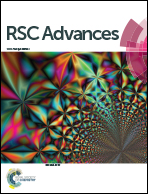Fabrication of sericin nanoparticles for controlled gene delivery
Abstract
Protein based nanoparticles are functionally efficient for drug or gene delivery due to their biodegradable nature and easy elimination from the body. Silk, a natural biomaterial, is being used extensively as drug/biomolecule delivery system. Silk protein sericin (glue protein) coates the silk fibers and is discarded as a waste product in the textile industry. As a potential biomaterial, sericin has multiple advantages due to its hydrophilic and cytocompatible nature. In this study, sericin based nanoparticles were prepared by a protein de-solvation method with a diameter of 100–150 nm. The structural morphology, surface charge and cytocompatibility were measured against mouse fibroblast. Modification of the surface charge (from anionic to cationic) was done to achieve optimum DNA binding. The cellular uptake of the FITC conjugated nanoparticles is analyzed and followed up by the delivery of extracellular genes within the fibroblasts. The successful expression of the green fluorescence protein confirms the prospective use of natural silk protein sericin based nanoparticles as a therapeutic DNA delivery system.


 Please wait while we load your content...
Please wait while we load your content...